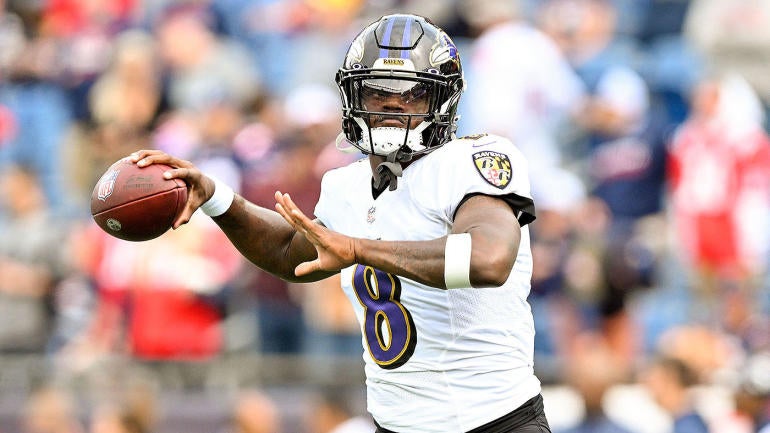
The franchise tag was originally intended to be a precursor for marquee players signing long-term contracts. It doesn't necessarily work that way.
The designation has evolved into a powerful management tool that restricts a team's best free agent in a given year from entering the open market regardless of whether he is a true marquee player. Most players haven't been happy when given a franchise tag. The designation can hinder the ability to gain long-term security because players must incur the risk of serious injury and poor performance again after already playing out their contracts when an agreement on a long-term deal can't be reached. In these cases, it is essentially a high-salaried, one-year, "prove-it" deal.
The franchise tag has been used 30 times over the last three years (2020-2022). Only 30% of the time (9 of 30) during this time frame was a long-term deal signed while under the designation.
A look at how franchise tags work is below. The projected 2023 franchise numbers and an examination of the best candidates to receive the designations next year follows.
Franchise tag logistics
NFL teams can retain the rights to one of its impending free agents in 2023 with the use of a transition non-exclusive or an exclusive franchise tag during a 15-day period from Feb. 21 to March 7.
How franchise tenders are calculated is misunderstood. Prior to the 2011 NFL collective bargaining agreement, non-exclusive franchise tags had been an average of the five largest salaries in the prior year at a player's position or 120% of the prior year's salary of the player, whichever was greater. For franchise tag purposes, salary means a player's salary cap number, excluding workout bonuses and most other performance bonuses.
The 120% and five largest salaries provisions have remained intact but the formula component is now calculated over a five-year period that's tied to a percentage of the overall salary cap. More specifically, the number for each position is derived by taking the sum of the non-exclusive franchise tags as determined by the original methodology for the previous five seasons and dividing by the sum of the actual NFL salary cap amount for the previous five seasons. The resulting percentage, which is known as the cap percentage average in the CBA, is then multiplied by the actual salary cap for the upcoming league year.
This non-exclusive tag allows a player to negotiate with other NFL teams but if he signs an offer sheet with another club, his team has five days to match the offer. If the offer is not matched, his team will receive two first-round picks as compensation from the signing team.
Under the exclusive franchise tag, a player will receive a one-year offer from his team that is the greater of the average of the top-five salaries at his position once the restricted free agent signing period of the current league year has ended (April 21 for 2023) or 120% of his prior year's salary. The non-exclusive number is initially used as a placeholder and adjusted upward if the exclusive calculation dictates once restricted free agency ends. A player cannot negotiate with other teams with the exclusive franchise tag.
The transition tag has been used with a lot less frequency than the franchise tag. It is based on the average of the top-10 salaries at a player's position using the same methodology as non-exclusive franchise tag calculations. The 120% provision also applies. Teams have the same right of first refusal as with franchise tags but do not receive any draft-choice compensation for declining to match an offer sheet.
2023 tag projections
The chart below contains an early look at the 2023 franchise tags. I keep track of the salary data necessary to do the calculations under the franchise and transition tag formulas. I recently confirmed with my NFL sources the 2022 data entering the formula.
There was a report recently that the 2023 salary cap could exceed $220 million -- $225 million is being used for the 2023 salary cap. That's the most common response given when surveying a handful of teams about the number being used internally for 2023 salary cap projections. That figure is an 8.07% increase from the current $208.2 million figure. The franchise tags are preliminary because the numbers can't be finalized until the 2023 salary cap is set, which is typically in late February or early March.
| POSITION | PROJECTED | CAP % AVERAGE | CURRENT | % CHANGE |
|---|---|---|---|---|
Cornerback | $18,156,000 | 8.069% | $17,287,000 | 5.03% |
Defensive end | $19,744,000 | 8.775% | $17,859,000 | 10.55% |
Defensive tackle | $18,954,000 | 8.424% | $17,396,000 | 8.96% |
Linebacker | $20,945,000 | 9.309% | $18,702,000 | 11.99% |
Offensive line | $18,260,000 | 8.116% | $16,662,000 | 9.59% |
Punter/kicker | $5,398,000 | 2.399% | $5,220,000 | 3.41% |
Quarterback | $32,445,000 | 14.42% | $29,703,000 | 9.23% |
Running back | $10,100,000 | 4.489% | $9,570,000 | 5.54% |
Safety | $14,473,000 | 6.432% | $12,911,000 | 12.1% |
Tight end | $11,355,000 | 5.047% | $10,931,000 | 3.88% |
Wide receiver | $19,761,000 | 8.783% | $18,419,000 | 7.29% |
Note: Projections assume 2023 salary cap is $225 million.
Top 2023 candidates
By CBA rule, the players currently under a one-year franchise tag, like Ravens quarterback Lamar Jackson, are prohibited from signing long term until the regular season ends on Jan. 8. The 49ers are precluded from designating quarterback Jimmy Garoppolo as a franchise or transition player. His renegotiated contract, where he took a substantial pay cut, contains a clause preventing either tag.
The Buccaneers can't keep Tom Brady from hitting the open market if he decides to keep playing football next season when he will be 46 years old. Brady has a clause in his contract like Garoppolo's.
Lamar Jackson, QB, Ravens
Jackson's great start to the season made him September's AFC Offensive Player of the Month. He had faded from the NFL MVP conversation before suffering a sprained PCL in his left knee during a Week 13 game against the Broncos. The injury is expected to keep Jackson out of action until Week's 16 contest versus the Falcons on Christmas Eve.
Jackson, who represents himself, reportedly turned down a five-year offer worth $250 million with $133 million fully guaranteed before cutting off negotiations shortly before the regular season started because he wants a fully guaranteed contract. The offer had the second highest average yearly salary and money fully guaranteed ever in an NFL contract. The fully guaranteed, five-year, $230 million contract the Browns gave quarterback Deshaun Watson in connection with his trade from the Browns to the Texans in March that Jackson views as a benchmark is an outlier.
Negotiations are expected to resume in January after the regular season ends. Jackson is destined to start playing the franchise tag game if both parties remain firmly entrenched in their positions on a fully guaranteed contract.
The exclusive franchise designation will be most likely. Four of the last five times quarterbacks have been designated as franchise players the exclusive tag has been used.
The 2023 exclusive quarterback franchise tag currently projects to $45.248 million. This number is subject to change depending on new quarterback deals, contract restructures, pay cuts and/or releases between now and then.
Geno Smith, QB, Seahawks
The Seahawks, who were expected to be in a rebuilding mode after trading quarterback Russell Wilson during the offseason, are in contention for a playoff berth with Smith having a Pro Bowl-caliber season. Smith was named October's NFC Offensive Player of the Month after guiding the Seahawks to four wins in five games. He has thrown for 3,433 yards with 25 touchdowns and eight interceptions in 13 games this season. Smith is connecting on a league-leading 71.5% of his passes, and has the NFL's third-best passer rating at 106.8.
The Seahawks reportedly want Smith back for 2023. Contract talks are expected to take place after the season. The path Seattle takes may hinge on Smith's financial demands. Smith would be justified in seeking a multiyear contract in excess of $30 million per year. According to NFLPA data, the average salary for starting quarterbacks, excluding those on rookie contracts, is $32,036,681 per year. If the Seahawks have enough concerns about regression since it's unknown whether this season is a true breakout performance for the 32-year-old or an anomaly, then some sort of designation may be warranted instead of making a long-term commitment in this salary stratosphere. Interestingly, the projected non-exclusive quarterback franchise tag approximates the average starter salary with veteran contracts.
Seattle could hedge its bets by selecting a quarterback early in the 2023 NFL Draft. Thanks to the Wilson trade, Seattle owns Denver's 2023 first-round pick, which would be second overall if the season ended today.
Josh Jacobs, RB, Raiders
The Raiders surely regret declining a fifth-year option in 2023 with Jacobs for a fully guaranteed, $8.034 million deal given the type of season he is having. There's a little over a $2 million difference between the salary for the declined option year and the projected running back franchise tag.
Jacobs has become an NFL Offensive Player of the Year candidate. He is leading the NFL with 1,402 rushing yards and 1,748 yards from scrimmage (combined rushing and receiving yards). His 11 rushing touchdowns are tied for third in the NFL.
Fortunately for the Raiders, running backs typically don't capitalize on free agency like players at most other positions. If Jacobs wasn't a running back, he would have a legitimate chance at replacing Christian McCaffrey as highest paid at the position. McCaffrey signed a four-year extension, averaging $16,015,853 per year with $39,162,500 of guarantees in 2020. He has a running back-best $30,062,500 fully guaranteed at signing.
There are eight running backs in the NFL with contracts averaging $12 million per year or more. All of the deals were for the players to remain with their own teams. The running back market with veteran contracts then takes a sharp downward turn with James Conner (Cardinals) and Leonard Fournette (Buccaneers) rounding out the top 10 on deals averaging $7 million per year.
Saquon Barkley, RB, Giants
The Giants attempting to negotiate a new deal with Barkley prior to Week's 9 bye suggests he is more of a signing priority and a better franchise tag candidate than quarterback Daniel Jones, whose fifth-year option in 2023 for $22.384 million wasn't exercised. The two sides reportedly weren't close to reaching a deal.
Presumably, Barkley wants to be among the league's five highest paid running backs. This would require Barkley topping the four-year, $50 million deal, averaging $12.5 million per year, Derrick Henry signed with the Titans in 2020 as a franchise player. Henry's deal is worth as much as $51 million through incentives and had $25.5 million fully guaranteed.
Barkley is having his best season since 2018 when he looked like a superstar in the making during a stellar debut season in which he led the NFL with 2,028 yards from scrimmage and earned NFL Offensive Rookie of the Year honors. Barkley is fourth in the NFL with 1,083 rushing yards. His 1,344 yards from scrimmage are the sixth most in the NFL.
Orlando Brown Jr., OT, Chiefs
Brown rejected a reported six-year, $139 million deal with a $30.25 million signing bonus at the July 15 deadline for franchise players to sign long term. Instead, Brown is playing under a $16.662 million franchise tag. That's because the deal was backloaded and too long for a 26-year-old Pro Bowl-caliber left tackle to accept. Cosmetically, Brown would have become the NFL's highest paid offensive lineman at $23,166,667 per year because of a highly inflated last year of the contract.
The deal was really $95 million for five years since there was a $44 million salary in 2027 that Brown would never see. Brown probably hasn't done anything this season to dissuade the Chiefs from putting a second franchise tag on him in 2023 for $19,994,440. This number is derived from the 20% raise provisions with franchise tags.
Dalton Schultz, TE, Cowboys
Schultz and the Cowboys were never close to a deal before the July 15 multiyear contract deadline for franchise players. The Browns signing David Njoku, who was also franchised, to a four-year deal, averaging $13,687,500 per year in June, instantly became Schultz's salary floor.
Schultz isn't going to approach his 2021 production of 78 catches, 808 receiving yards and eight touchdowns when he had a career year because of being slowed by a PCL issue in his right knee that has kept him out of two games. A lack of chemistry with backup quarterback Cooper Rush while Dak Prescott missed five games with a fractured right thumb is also a contributing factor. There really hasn't been a statistical drop-off from last season for Schultz when Prescott is at quarterback.
A second Schultz franchise tag in 2023 will be $13,117,200. It's 20% more than the $10.931 million tender he quickly signed after the Cowboys made him a franchise player in March.
Dallas could decide to let Schultz walk rather than pay him more than Njoku. Jake Ferguson, a 2022 fourth-round pick, and Peyton Hendershot, a 2022 undrafted free agent, are first-year players on rookie contracts who would be at a fraction of Schultz's cost next year and beyond.
Tony Pollard, RB, Cowboys
Dallas has two viable options for a franchise tag because Pollard is the most effective running back on the roster despite Ezekiel Elliott's presence. Pollard appears to be headed for his first 1,000-yard rushing season. He is on pace for 1,169 yards. Pollard is second among NFL running backs with 5.7 yards per carry.
Retaining Pollard whether on a long-term deal or franchise tag could come at Elliott's expense. Pollard is expected to be cheaper over the next three years than the $36.3 million Elliott is scheduled to make from 2023 through 2025. Teams rarely make a significant financial investment in two running backs simultaneously. Elliott having the 2023's second largest running back cap hit at $16.72 million on a $10.9 million salary makes him a potential salary cap casualty with Pollard remaining in the fold.
Jessie Bates, S, Bengals
Bates didn't sign his $12.911 million franchise tender until the latter part of August after negotiations failed to produce a multiyear agreement. He hasn't let the lack of signing long term affect his play this season like during the early part of 2021 when he was in the final year of his rookie contract.
A second franchise tag for Bates would be $15,493,200 -- 120% of his current one. If history is any indication, Bates is headed for the open market after the season. There isn't a track record of the Bengals using a franchise tag on the same player in consecutive years.
Bates is likely playing elsewhere in 2023 if he becomes an unrestricted free agent. His reasonable worst-case scenario in free agency should be the five-year, $70 million contract, averaging $14 million per year, Marcus Williams received from the Ravens on the open market this year with $37 million in guarantees ($32 million fully guaranteed at signing).
Bates probably has his sights set a lot higher than the Williams deal. David Mulugheta, his agent, reset the safety market in August when Derwin James signed a four-year, $76 million extension with $42 million in guarantees where $38,584,471 was fully guaranteed at signing.
Cincinnati seemingly has a contingency plan in place for an eventual Bates departure. Safety Daxton Hill was selected 31st overall in this year's draft.
Daron Payne, DT, Commanders
The presumption was 2022 was going to be Payne's last year in Washington because there wasn't much interest in extending his contract during the offseason. The calculus could be changing in Washington with Payne elevating his game as a pass rusher this season.
Payne, who is playing under an $8.529 million fifth-year option, is third in the NFL among interior defensive linemen with a career-high 8.5 sacks. His 15 tackles for loss are tied for the second most in the league.
The Commanders should be prepared to exceed the contract given to Jonathan Allen to keep arguably the best interior defensive line tandem together long term. Allen signed a four-year, $72 million extension, averaging $18 million per year, in 2021.
The 25-year-old Payne should be one of the beneficiaries of Aaron Donald dramatically resetting the market of interior defensive linemen, particularly if he hits the open market. Donald signed a three-year, $95 million deal, averaging $31,666,667 per year, in June. There is a huge gap between Donald and the next highest paid interior defensive lineman (DeForest Buckner/Leonard Williams) at $21 million per year. Donald's deal averages nearly 51% more. Expect this gap to be closed during the upcoming offseason.
![[object Object] Logo](https://sportshub.cbsistatic.com/i/2020/04/22/e9ceb731-8b3f-4c60-98fe-090ab66a2997/screen-shot-2020-04-22-at-11-04-56-am.png)



































